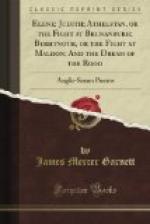His wit of wisdom. This word he spake:
’That shall be known that the horse of the king
Shall ’neath the proud with bit be adorned,
With bridle-rings. That beacon to God
Shall holy be called, and that one valor-blessed, 1195
Honored in war, who rides on that horse.’”
With haste then that did all perform
Helena ’fore earls, bade the aetheling’s,
Heroes’ ring-giver’s, bridle adorn,
To her own son sent as a present 1200
O’er ocean’s stream the blameless gift.
She bade then together those whom as best
Of men she knew among the Jews,
Of the race of heroes, to the holy city,
To the town to come. Then gan the queen 1205
The dear ones teach that love of the Lord
And peace likewise among themselves,
The bond of friendship, they fast should hold
Without reproach in time of their life,
And they to the teacher’s lore should hearken, 1210
The Christian virtues that Cyriacus taught them,
Clever in books. The office of bishop
Was fairly made fast. From afar oft to him
The lame, the sick, the crippled came,
The halt, the wounded, the leprous and blind, 1215
The lowly, the sad; always there health
At the hands of the bishop, healing, they found
Ever for ever. Yet Helena gave him
Treasures as presents, when ready she was
For the journey home, and bade she then all 1220
In that kingdom of men who worshipped God,
Men and women, that they should honor
With mind and might that famous day,
With thoughts of the heart, whereon holy rood
Had been discovered, greatest of trees, 1225
Of those which from earth ever sprang up
Grown under leaves. Then spring was gone
Except six nights ere coming of summer
On the kalends of May. To each of those men
Be hell’s door shut, heaven’s unclosed, 1230
Eternally opened the kingdom of angels,
Joy without end, and their portion appointed
Along with. Mary, who takes into mind
That one most dear of festal days
Of that rood under heaven, that which the mightiest 1235
Ruler of all with arm protected. Finit.[2]
’That shall be known that the horse of the king
Shall ’neath the proud with bit be adorned,
With bridle-rings. That beacon to God
Shall holy be called, and that one valor-blessed, 1195
Honored in war, who rides on that horse.’”
With haste then that did all perform
Helena ’fore earls, bade the aetheling’s,
Heroes’ ring-giver’s, bridle adorn,
To her own son sent as a present 1200
O’er ocean’s stream the blameless gift.
She bade then together those whom as best
Of men she knew among the Jews,
Of the race of heroes, to the holy city,
To the town to come. Then gan the queen 1205
The dear ones teach that love of the Lord
And peace likewise among themselves,
The bond of friendship, they fast should hold
Without reproach in time of their life,
And they to the teacher’s lore should hearken, 1210
The Christian virtues that Cyriacus taught them,
Clever in books. The office of bishop
Was fairly made fast. From afar oft to him
The lame, the sick, the crippled came,
The halt, the wounded, the leprous and blind, 1215
The lowly, the sad; always there health
At the hands of the bishop, healing, they found
Ever for ever. Yet Helena gave him
Treasures as presents, when ready she was
For the journey home, and bade she then all 1220
In that kingdom of men who worshipped God,
Men and women, that they should honor
With mind and might that famous day,
With thoughts of the heart, whereon holy rood
Had been discovered, greatest of trees, 1225
Of those which from earth ever sprang up
Grown under leaves. Then spring was gone
Except six nights ere coming of summer
On the kalends of May. To each of those men
Be hell’s door shut, heaven’s unclosed, 1230
Eternally opened the kingdom of angels,
Joy without end, and their portion appointed
Along with. Mary, who takes into mind
That one most dear of festal days
Of that rood under heaven, that which the mightiest 1235
Ruler of all with arm protected. Finit.[2]
[1] Gn.’s emendation.
[2] Here properly ends the legend
of the Finding of the Cross.
The last
canto contains reflections of the poet.
XV.
Thus old and death-ready in this frail house
Word-craft I wove and wondrously framed it,
Reflected at times and sifted my thought
Closely at night. I knew not well
1240
The truth of the rood,[1] ere wider knowledge
Through glorious might into thought of my mind
Wisdom revealed to me. I was stained with crimes,
Fettered with sins, pained with sorrows,




